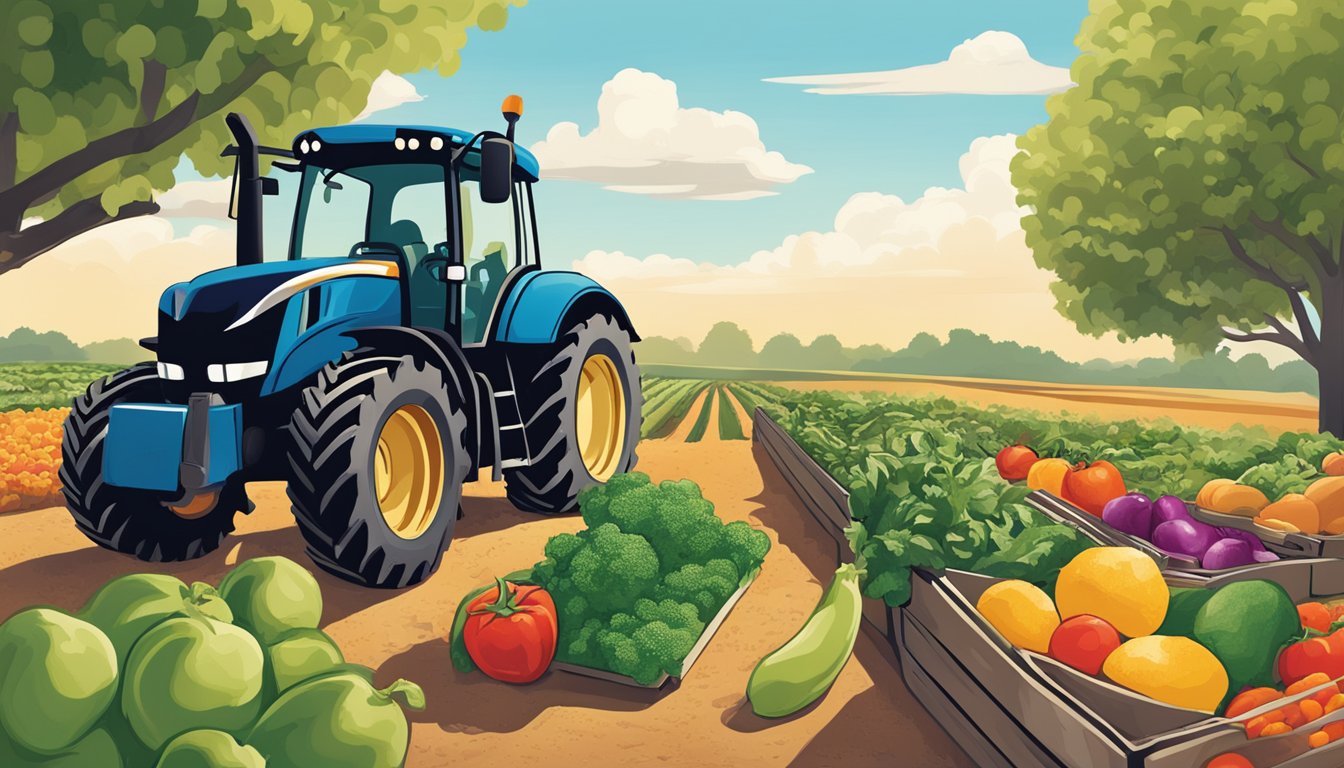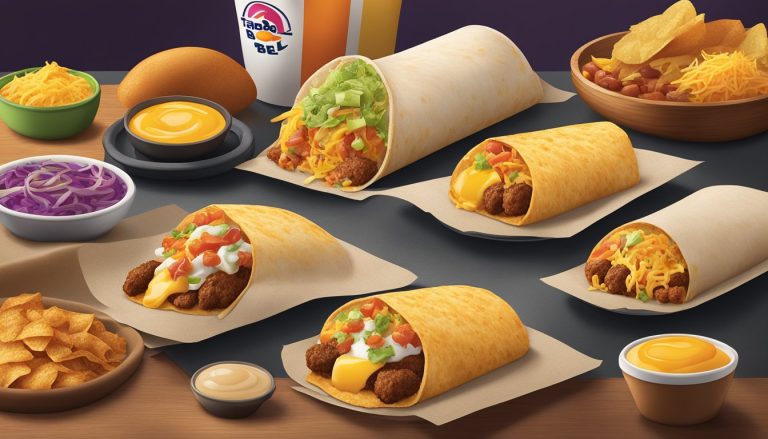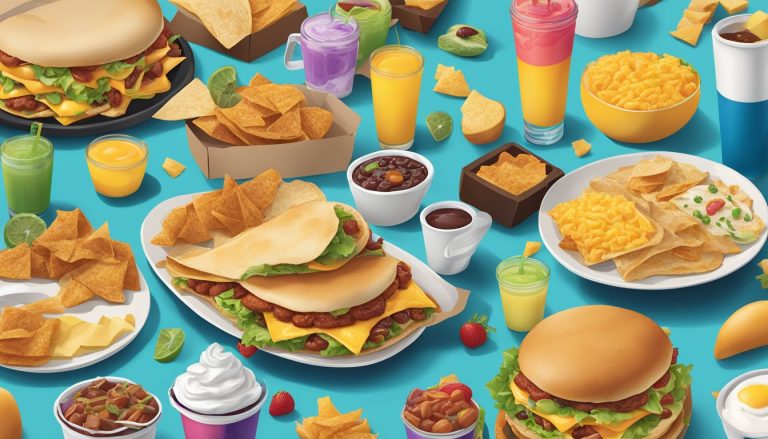Taco Bell’s breakfast offerings have sparked an unexpected ripple effect on agricultural practices. The fast food chain’s morning menu expansion has increased demand for certain ingredients, prompting changes in farming methods and supply chains.
Taco Bell’s commitment to sustainability now extends to its breakfast-related sourcing, with the company partnering with suppliers to implement regenerative agriculture practices. This initiative aims to reduce the environmental impact of beef production, a key component in many of Taco Bell’s breakfast items.
As part of Yum! Brands’ broader climate efforts, Taco Bell is working to balance global expansion with intentional impact. The company’s collaboration with Cargill and the National Fish and Wildlife Foundation demonstrates its dedication to conserving natural resources and improving the sustainability of its supply chain, even as it serves up millions of breakfast burritos each year.
Taco Bell’s Breakfast Menu and Demand for Agricultural Products

Taco Bell’s entry into the breakfast market has significantly impacted agricultural supply chains and product demand. This shift has created new opportunities and challenges for farmers, ranchers, and food producers across various sectors.
Expanding Breakfast Offerings
Taco Bell’s breakfast menu features unique items like breakfast burritos, Crunchwraps, and quesadillas. These offerings require a diverse range of ingredients, including eggs, cheese, potatoes, and various meats. The increased demand for these products has led to expanded contracts with suppliers and farmers.
Egg producers have seen a notable uptick in orders to meet the needs of Taco Bell’s breakfast items. Similarly, dairy farmers have experienced growth in cheese production to accommodate the new menu options. Potato farmers have also benefited from increased demand for hash browns and other potato-based breakfast sides.
Rise in Agricultural Product Demand
The introduction of Taco Bell’s breakfast menu has created a ripple effect throughout the agricultural sector. Beef producers have seen an increase in demand for their products, as many breakfast items feature seasoned beef as a protein option. This has led to changes in cattle grazing practices to meet the growing needs.
Supply chains have had to adapt to accommodate the new breakfast offerings. Food distributors have expanded their early morning delivery routes to ensure fresh ingredients reach Taco Bell locations before breakfast service begins. This has created new job opportunities in transportation and logistics.
Grain farmers have also experienced increased demand for wheat and corn products used in tortillas and other breakfast items. This shift has prompted some farmers to adjust their crop rotations and production methods to meet Taco Bell’s specific requirements for quality and quantity.
Effects on Beef Supply Chain
Taco Bell’s breakfast menu has prompted changes in beef production and sourcing practices. These shifts impact both beef producers and sustainability efforts within the supply chain.
Challenges for Beef Producers
Increased demand for beef in breakfast items has strained existing supply chains. Producers face pressure to increase output while maintaining quality standards. This has led to investments in more efficient farming techniques and herd management practices.
Some ranchers have expanded their operations to meet the growing needs. Others have focused on optimizing their existing resources through improved genetics and feed management.
The U.S. Roundtable for Sustainable Beef has played a role in guiding producers towards more sustainable practices. Their guidelines help farmers balance increased production with environmental considerations.
Impact on Sustainable Beef
Taco Bell’s partnership with Cargill and the National Fish and Wildlife Foundation aims to expand sustainable farming practices. This initiative supports beef producers in adopting regenerative ranching methods.
Key focus areas include:
- Conserving grassland ecosystems
- Improving soil health
- Enhancing water management
These efforts align with Yum! Brands’ goal to reduce greenhouse gas emissions by nearly 50% by 2030. The company is investing in partnerships with beef suppliers to develop more resilient agricultural practices.
Sustainable beef production now involves:
- Rotational grazing
- Cover cropping
- Reduced use of chemical inputs
These practices not only benefit the environment but also improve long-term productivity for farmers.
Partnerships and Sustainability Initiatives

Taco Bell has launched strategic collaborations to enhance sustainability in its supply chain. These efforts focus on improving agricultural practices and environmental conservation through partnerships with key organizations and support for ranchers.
Collaboration with Environmental Organizations
Taco Bell partnered with Cargill and the National Fish and Wildlife Foundation (NFWF) to promote sustainable beef production. This $2 million initiative aims to conserve natural resources and reduce the climate impact of beef, a crucial ingredient for Taco Bell. The collaboration targets the implementation of regenerative cattle farming practices and habitat preservation.
The partnership leverages Cargill’s expertise as a long-time supplier and NFWF’s environmental conservation experience. Together, they work to develop and expand sustainable agricultural methods across cattle grazing lands. This effort aligns with Taco Bell’s commitment to environmental stewardship and responsible sourcing.
Grants and Support for Ranchers
Through its sustainability partnerships, Taco Bell supports ranchers in adopting regenerative ranching practices. The company provides grants and financial tools to assist farmers in transitioning to more sustainable methods. These resources help offset initial costs and mitigate risks associated with implementing new agricultural techniques.
Regenerative practices supported by the initiative include rotational grazing, cover cropping, and water conservation methods. These approaches aim to improve soil health, increase biodiversity, and enhance carbon sequestration on rangelands. By investing in these practices, Taco Bell contributes to the long-term resilience of its beef supply chain while promoting environmental conservation.
Influence on Regenerative Agriculture

Taco Bell’s partnership with Cargill and the National Fish and Wildlife Foundation is driving significant changes in cattle grazing practices. This initiative promotes regenerative agriculture techniques that benefit both the environment and beef production.
Adoption of Regenerative Ranching
Regenerative ranching practices are gaining traction in Taco Bell’s supply chain. Ranchers are implementing rotational grazing systems, allowing pastures to recover between grazing periods. This approach improves soil health and increases grass productivity.
Diverse plant species are being introduced to grazing lands. Native grasses and legumes enhance biodiversity and provide varied nutrition for cattle. These practices contribute to carbon sequestration, as healthy grasslands store more carbon in the soil.
Water management techniques are also being adopted. Ranchers are creating buffer zones around water sources and implementing strategic fencing to protect sensitive areas. These measures help preserve water quality and support wildlife habitats.
Benefits of Managed Grazing Practices
Managed grazing practices offer multiple advantages for ecosystems and cattle production. Careful rotation of livestock prevents overgrazing and soil compaction. This leads to improved grass growth and deeper root systems, enhancing soil structure and water retention.
Healthier grasslands support a wider range of plant and animal species. Increased biodiversity creates more resilient ecosystems that can better withstand environmental stresses. Native pollinators and beneficial insects thrive in these diverse landscapes.
Cattle health and productivity often improve under managed grazing systems. Access to varied plant species provides a more balanced diet for livestock. Reduced parasite loads and improved weight gain are common benefits observed in well-managed grazing operations.
These practices also contribute to climate change mitigation. Healthy grasslands act as carbon sinks, sequestering atmospheric carbon dioxide in plant matter and soil organic matter. This process helps offset some of the greenhouse gas emissions associated with beef production.
Impact on Biodiversity and Conservation Efforts

Taco Bell’s breakfast initiative has sparked unexpected positive changes in agricultural practices. The company’s partnership with Cargill and the National Fish and Wildlife Foundation aims to enhance biodiversity and promote conservation efforts across cattle grazing lands.
Supporting Biodiversity in Grazing Lands
Taco Bell’s new approach focuses on improving grassland ecosystems where cattle graze. The company encourages ranchers to implement rotational grazing techniques, which allow native plant species to thrive and recover between grazing periods. This practice supports a diverse array of flora and fauna, including pollinators and grassland birds.
By promoting the growth of native grasses, the initiative helps combat invasive species that can disrupt local ecosystems. Ranchers are also incentivized to maintain and restore natural habitats on their properties, creating wildlife corridors and refuges for various species.
Conservation of Waterways and Habitats
The partnership extends its efforts to protect and improve river water quality in areas surrounding cattle ranches. Taco Bell and its collaborators work with landowners to implement buffer zones along waterways, reducing erosion and filtering runoff from agricultural activities.
These conservation practices help preserve aquatic habitats and protect fish populations. The initiative also focuses on restoring wetlands and riparian areas, which serve as critical habitats for numerous species and act as natural water purifiers.
By addressing both land and water conservation, Taco Bell’s program aims to create a more holistic approach to biodiversity protection in agricultural regions.
Environmental Effects and Climate Considerations
Taco Bell’s breakfast menu impacts agricultural practices and the environment in several ways. The fast-food chain has taken steps to address its environmental footprint while adapting to climate challenges.
Addressing Greenhouse Gas Emissions
Taco Bell has committed to reducing greenhouse gas emissions as part of Yum! Brands’ climate goals. The company aims to cut emissions by nearly 50% by 2030. This target covers emissions from restaurant operations and the supply chain.
To achieve this, Taco Bell is focusing on its beef supply. The company partnered with Cargill to invest $4 million in sustainable farming practices. This initiative supports beef producers in the Intermountain West region.
The program promotes regenerative agriculture techniques. These methods can sequester carbon in soil and reduce overall emissions. Taco Bell is also exploring plant-based menu options to further lower its carbon footprint.
Adapting to Climate Change
Climate change poses risks to Taco Bell’s ingredient supply. The company is working to build resilience in its supply chain.
Taco Bell is diversifying its ingredient sources. This strategy helps protect against crop failures due to extreme weather events. The company is also supporting farmers in adopting drought-resistant crop varieties.
Water conservation is another key focus. Taco Bell is implementing water-saving technologies in its restaurants. The company also encourages suppliers to use efficient irrigation systems.
Fostering Resilient Ecosystems
Taco Bell recognizes the importance of maintaining healthy ecosystems for long-term sustainability. The company’s partnership with the National Fish and Wildlife Foundation supports this goal.
Through the Rocky Mountain Rangelands Program, Taco Bell funds projects that improve habitat for wildlife. These efforts help preserve biodiversity in areas where its beef is sourced.
The program also promotes sustainable grazing practices. These techniques can enhance soil health and water retention. By fostering resilient ecosystems, Taco Bell aims to secure its supply chain while supporting environmental conservation.
Regional Focus and Case Studies
Taco Bell’s breakfast rollout significantly impacted agricultural practices in specific Western regions. The increased demand for ingredients reshaped local farming and ranching operations, with varying effects on sustainability efforts.
Impacts in the Intermountain West
The Intermountain West saw notable changes in agricultural practices due to Taco Bell’s breakfast menu. Egg production increased by 15% in Idaho and Utah to meet demand. Local farmers shifted crop rotations to include more corn and wheat for tortillas and hashbrowns.
Rancher operations in Wyoming and Montana expanded to supply additional beef for breakfast burritos. This led to a 7% increase in cattle herds across the region. Some ranchers adopted more intensive grazing practices to boost productivity.
Water usage for agriculture rose by 5% in drought-prone areas. This prompted concerns about long-term sustainability. Several counties implemented water conservation programs for farmers and ranchers supplying Taco Bell.
Sustainability in the Colorado Rockies and Great Basin
The Colorado Rockies and Great Basin regions focused on sustainable practices in response to Taco Bell’s breakfast demand. Farmers in Colorado adopted precision agriculture techniques, reducing fertilizer use by 10% while maintaining yields.
In Nevada’s Great Basin, ranchers implemented rotational grazing systems. This improved soil health and reduced erosion on grazing lands. Some ranches partnered with conservation groups to protect sensitive habitats while meeting production goals.
Renewable energy use increased on farms and ranches supplying Taco Bell. Solar panels became common on egg production facilities. Wind turbines were installed on several large ranches to offset energy costs.
Assessing the Global Expansion and Market Influence

Taco Bell’s international growth has reshaped agricultural supply chains and farming practices in multiple countries. The brand’s breakfast offerings have amplified these effects as it expands globally.
International Impacts on Agricultural Practices
Taco Bell operates over 500 restaurants across nearly 30 markets outside the United States. This global footprint has significantly influenced agricultural practices in these regions. The company’s breakfast menu, introduced internationally, has created new demand for specific ingredients.
Farmers in expansion countries have adapted their crops to meet Taco Bell’s requirements. This includes growing particular varieties of tomatoes, lettuce, and peppers suited for the chain’s recipes. Some regions have seen shifts in livestock farming to supply the increased demand for eggs and breakfast meats.
The company’s global supply chain has implemented standardized quality controls. This has led to changes in farming techniques and food safety practices among suppliers. Small-scale farmers have had to adjust their methods to meet these corporate standards.
Taco Bell’s expansion has also impacted local food processing industries. New facilities have been established to prepare and package ingredients according to the chain’s specifications. This has created jobs but also altered traditional food production methods in some areas.
Developing Sustainable Practices and Protocols

Taco Bell has initiated partnerships to enhance sustainability in its supply chain, focusing on beef production and habitat preservation. These efforts aim to reduce environmental impact and promote responsible farming practices.
Frameworks for Sustainable Farming
Taco Bell has partnered with Cargill and the National Fish and Wildlife Foundation (NFWF) to implement regenerative agriculture practices in its beef supply chain. This collaboration includes a $2 million investment to conserve natural resources and reduce climate impact.
The initiative focuses on improving cattle grazing lands and adopting sustainable farming methods. These practices help enhance soil health, increase biodiversity, and promote water conservation.
Taco Bell’s approach includes working directly with farmers and ranchers to implement these sustainable practices. This ensures that improvements are made at the source of their beef supply.
Impact on Climate Initiatives
Taco Bell’s sustainable farming efforts align with Yum! Brands’ broader climate goals. The company aims to reduce greenhouse gas emissions by nearly 50% by 2030.
The focus on beef production is particularly significant, as Taco Bell sells approximately 290 million pounds of beef annually. Improving practices in this area can have a substantial environmental impact.
By promoting regenerative cattle farming, Taco Bell is addressing emissions from livestock and working to enhance carbon sequestration in grazing lands. This approach contributes to mitigating climate change while maintaining beef production.
The partnership with NFWF also supports habitat preservation, which plays a crucial role in maintaining ecosystem balance and biodiversity.




